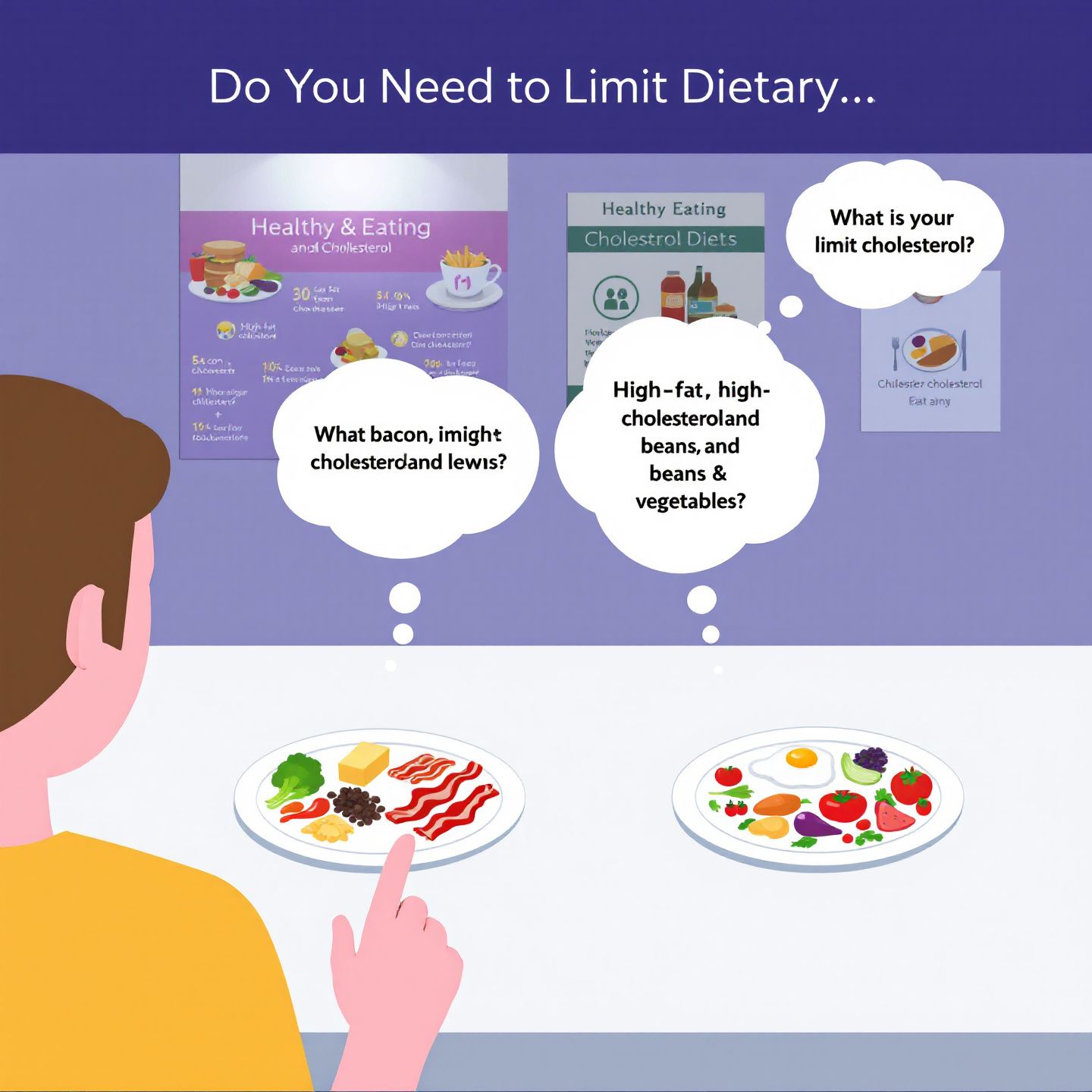For decades, dietary cholesterol has been considered a key contributor to heart disease and high blood cholesterol levels. People were routinely advised to avoid foods rich in cholesterol, such as eggs, shellfish, and red meat. However, scientific research and public health guidelines have evolved considerably, especially in recent years.
In 2025, experts largely agree that dietary cholesterol intake has a much smaller effect on blood cholesterol than once thought. Instead, attention has shifted to other dietary factors such as saturated fats, trans fats, and overall diet quality. This article examines the latest evidence and guidance on whether limiting dietary cholesterol is still necessary, helping you make informed decisions about your nutrition and heart health.
What Is Cholesterol and Why Does It Matter?
Cholesterol is a waxy, fat-like substance essential for various bodily functions. It is a critical component in:
-
Producing hormones such as estrogen and testosterone
-
Synthesizing vitamin D
-
Forming bile acids that aid digestion
Cholesterol circulates in the blood within particles called lipoproteins, primarily low-density lipoprotein (LDL) and high-density lipoprotein (HDL). LDL is often termed “bad cholesterol” because high levels can lead to plaque buildup in arteries, increasing heart disease risk. In contrast, HDL is considered “good cholesterol” because it helps remove excess cholesterol from the bloodstream.
Interestingly, the human body manufactures about 75% of its cholesterol, with the remainder coming from dietary sources. This internal regulation means the liver can adjust cholesterol production based on dietary intake. When more cholesterol is consumed, the body often compensates by producing less, limiting blood cholesterol changes.
The History of Dietary Cholesterol Guidelines
Historically, dietary cholesterol was directly linked to heart disease risk, prompting recommendations to limit cholesterol intake to under 300 mg per day, or even less for at-risk individuals. Foods like eggs, shellfish, and organ meats were avoided or consumed sparingly.
However, recent decades have brought new insights:
-
Meta-analyses of population studies have shown no consistent link between dietary cholesterol and heart disease in healthy individuals.
-
The 2015–2020 Dietary Guidelines for Americans removed the previous cholesterol limit, focusing instead on saturated fats and added sugars.
-
The 2023 update from the American Heart Association emphasized whole dietary patterns rather than single nutrients.
Thus, cholesterol’s role in diet has been reinterpreted, shifting the focus towards the types of fats consumed and the overall quality of the diet.
How Does Dietary Cholesterol Affect Blood Cholesterol?
Despite its name, dietary cholesterol’s impact on blood cholesterol levels is modest for most people. Clinical trials and large observational studies have demonstrated the following:
-
On average, dietary cholesterol raises LDL cholesterol by only about 5–10% in most individuals.
-
Some people, called “hyper-responders,” may experience a greater increase, but even in these cases, the LDL-to-HDL ratio often remains balanced.
-
Saturated fats and trans fats found in processed and animal foods have a more profound effect on raising LDL cholesterol.
Therefore, blood cholesterol levels are influenced more significantly by the overall dietary pattern and lifestyle factors than by dietary cholesterol alone.
Foods That Are High in Cholesterol
Common foods naturally high in cholesterol include:
-
Eggs (particularly the yolk)
-
Shellfish (shrimp, crab, lobster)
-
Organ meats (liver, kidney)
-
Red meats (beef, pork, lamb)
-
Full-fat dairy products (cheese, butter, cream)
It is important to note that many of these foods, such as eggs and shellfish, are nutrient-dense and provide high-quality protein, vitamins, and minerals. Recent evidence supports including these foods in moderation as part of a balanced diet.
Which Fats Matter More Than Cholesterol?
When considering heart health, the type and amount of fat consumed play a more significant role than cholesterol intake itself:
Saturated Fats
These fats, found in fatty cuts of meat, butter, cheese, and some tropical oils (like coconut and palm oil), raise LDL cholesterol more strongly than dietary cholesterol. Their reduction is recommended to lower cardiovascular risk.
Trans Fats
Often present in processed and fried foods, trans fats raise LDL cholesterol and lower HDL cholesterol. Their intake is linked to a higher risk of heart disease and should be minimized or avoided entirely.
Unsaturated Fats
Monounsaturated and polyunsaturated fats, found in olive oil, nuts, seeds, and fatty fish, have been shown to improve cholesterol levels by reducing LDL and increasing HDL.
Foods That Support Healthy Cholesterol Levels
A diet aimed at improving cholesterol should emphasize:
-
Soluble fiber-rich foods: Oats, barley, beans, lentils, apples, and psyllium can help reduce LDL by binding cholesterol in the digestive tract.
-
Fatty fish rich in omega-3 fatty acids: Salmon, mackerel, sardines, and herring reduce triglycerides and support heart health.
-
Nuts and seeds: Almonds, walnuts, flaxseeds, and chia seeds provide healthy fats and fiber.
-
Olive oil: Replacing saturated fats with extra virgin olive oil provides antioxidants and improves lipid profiles.
-
Plant-based diets: Incorporating more vegetables, fruits, whole grains, and legumes supports healthy cholesterol and overall cardiovascular health.
Foods to Limit for Heart Health
Even though dietary cholesterol may not require strict limitation, certain foods still pose risks due to their fat content or processing:
-
Processed meats: Sausages, bacon, and hot dogs are high in saturated fat and sodium.
-
Fried and fast foods: Often cooked in hydrogenated oils containing trans fats.
-
Commercial baked goods: Cakes, cookies, and pastries frequently contain saturated fats, trans fats, and added sugars.
-
Sugary beverages and snacks: Excess sugar can raise triglycerides and contribute to metabolic issues.
Understanding Your Cholesterol Blood Test
Regular monitoring of blood lipids helps assess cardiovascular risk. The standard test measures:
| Lipid Type | Ideal Level (mg/dL) |
|---|---|
| Total Cholesterol | Less than 200 |
| LDL Cholesterol | Less than 100 |
| HDL Cholesterol | 60 or higher |
| Triglycerides | Less than 150 |
Interpreting these values involves looking at the balance between LDL and HDL as well as triglyceride levels. Additionally, your healthcare provider considers other factors such as blood pressure, smoking status, diabetes, and family history.
Lifestyle Factors Influencing Cholesterol
Several lifestyle habits play a pivotal role in maintaining healthy cholesterol levels:
Regular Physical Activity
Engaging in at least 150 minutes of moderate aerobic exercise weekly helps raise HDL and lower LDL cholesterol.
Smoking Cessation
Quitting smoking improves HDL levels and reduces arterial damage, thereby lowering heart disease risk.
Stress and Sleep Management
Poor sleep and chronic stress negatively affect lipid metabolism. Prioritizing 7–9 hours of quality sleep and stress-reduction techniques like meditation can support healthy cholesterol.
Maintaining Healthy Weight
Weight loss, especially reducing abdominal fat, improves cholesterol profiles by lowering LDL and triglycerides and raising HDL.
Frequently Asked Questions
Is Dietary Cholesterol Bad for Everyone?
No. For most people, moderate dietary cholesterol does not significantly affect blood cholesterol or heart disease risk. Individual differences exist, so personalized advice may be needed.
Should Eggs Be Avoided?
No. Eggs are nutrient-rich and can be safely included in most diets. Studies indicate moderate egg consumption does not increase heart disease risk in healthy individuals.
Are There Any Conditions That Require Cholesterol Limits?
People with familial hypercholesterolemia or existing cardiovascular disease may benefit from limiting cholesterol under professional guidance.
Is There a Recommended Daily Cholesterol Limit?
Most recent guidelines do not specify a strict limit but focus on reducing saturated and trans fats. Emphasis is placed on overall healthy eating patterns.
Expert Opinions
Dr. Andrea Lum, cardiologist at the Cleveland Clinic, states:
“Cholesterol from food does not influence blood cholesterol as much as previously believed. Focus should be on healthy dietary patterns, including Mediterranean or DASH diets, which emphasize fruits, vegetables, whole grains, and healthy fats.”
Public health bodies such as the World Health Organization advocate for reducing processed food intake and increasing whole plant foods rather than focusing narrowly on cholesterol alone.
Sample Cholesterol-Friendly Meal Plan
| Meal | Foods Included |
|---|---|
| Breakfast | Oatmeal with blueberries and flaxseed, green tea |
| Snack | Handful of walnuts, an apple |
| Lunch | Grilled salmon salad with olive oil vinaigrette, whole grain bread |
| Snack | Low-fat yogurt with chia seeds |
| Dinner | Lentil soup, roasted vegetables, brown rice |
| Dessert | Fresh fruit bowl or small piece of dark chocolate |
This plan prioritizes fiber, healthy fats, and antioxidants, promoting balanced cholesterol levels and heart health.
Is Limiting Dietary Cholesterol Still Necessary?
In 2025, dietary cholesterol is no longer considered a primary factor in heart disease risk for most people. Instead, the focus has shifted toward limiting saturated and trans fats and adopting a whole-food, nutrient-rich diet.
While moderation in cholesterol-rich foods is reasonable, especially for individuals with specific health concerns, the quality and balance of your overall diet are paramount.
Consultation with healthcare professionals is recommended to tailor nutrition to individual health needs. Ultimately, embracing diverse, plant-forward meals, regular physical activity, and healthy lifestyle habits offers the best strategy for optimal cholesterol levels and cardiovascular health.
Feel free to check out our other website at : machinepwr.com











